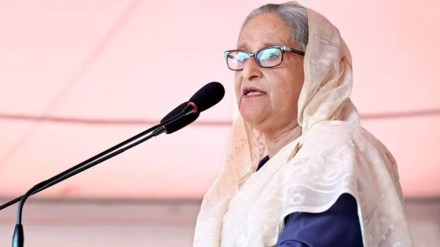In recent years, former Bangladesh Prime Minister Sheikh Hasina’s close relationship with Russia has drawn international attention. Amidst the global sanctions against Russia, Bangladesh continued to strengthen its ties with the Kremlin, sparking concerns and speculations about Hasina’s possible asylum in Russia following her abrupt departure from her home country.
Bangladesh’s Growing Proximity to Russia
Sheikh Hasina’s administration fostered a notably close relationship with Russia. This was particularly evident in Bangladesh’s cooperation with Russia on nuclear energy. Last year in October, Russian President Vladimir Putin announced that Russia would supply nuclear fuel for Bangladesh’s Rooppur Nuclear Power Plant (NPP).
According to an official statement issued by ROSATOM last October, during the virtual ceremony dedicated to the delivery of the first batch of nuclear fuel held at Rooppur NPP construction site in Bangladesh, President Vladimir Putin, Sheikh Hasina, Prime Minister of and Rafael Grossi, IAEA Director General participated. The ceremony marked the receipt of the status of a nuclear facility by the first NPP in Bangladesh.
“The fuel for Rooppur NPP was manufactured in Russia at Novosibirsk Chemical Concentrates Plant (NCCP), an enterprise of Rosatom’s Fuel Division. The fuel manufacture and transportation was performed under an active guidance and supervision of Bangladesh Atomic Energy Regulatory Authority (BAERA),” read the statement.
This collaboration marked a significant step towards Bangladesh’s nuclear aspirations, potentially making it a country with nuclear energy capabilities. However, this deepening relationship with Russia was not well received by all international players, especially in the West.
In addition to the nuclear partnership, Bangladesh applied to join the BRICS group—a coalition comprising Brazil, Russia, India, China, and South Africa. The BRICS group’s growing influence in global economic and political arenas made it a coveted alliance for many developing nations. Hasina’s move to align Bangladesh with BRICS indicated a shift towards a more diversified foreign policy, less reliant on Western powers.
The Consequences of Aligning with Russia
Despite the apparent benefits of a closer relationship with Russia, Sheikh Hasina’s alignment with Moscow did not sit well with many Western countries. The United States, in particular, has a history of scepticism towards countries closely allied with Russia. This geopolitical stance was reflected in the U.S.’s increasing support for Bangladesh’s main opposition party, the Bangladesh Nationalist Party (BNP).
The culmination of these tensions led to a precarious situation for Hasina. Her resignation and subsequent departure from Bangladesh were seen by some as a direct consequence of her political alliances and policies. Her close relationship with Russia may have made her a target in the intricate web of international politics.
The Asylum Dilemma
Following her exit from Bangladesh, Hasina’s next steps have been a subject of intense speculation. While she initially sought asylum in the United Kingdom, reports suggest that the UK government is unlikely to grant her request. The UK’s strict immigration laws and the presence of influential BNP loyalists within the country might be contributing factors. Furthermore, the UK’s call for an UN-led investigation into the events in Bangladesh suggests a cautious approach towards Hasina’s asylum request, given potential accusations of human rights violations during her tenure.
With the UK option potentially off the table, other countries have emerged as possible refuges. The United Arab Emirates and Saudi Arabia are reportedly being considered, given their neutral stances and historical willingness to host political figures in exile. However, Hasina’s closest allies and family members reside in the United States, Finland, and India. While the US is an option, the strained relations between Hasina and the Biden administration, particularly after the US’s criticisms of Bangladesh’s recent elections and sanctions, complicate her prospects there.
The Russian Option
Among the potential destinations, Russia stands out as a possible haven for Sheikh Hasina. Her strong ties with President Putin and Russia’s historical openness to hosting political figures in exile make it a viable option. However, no official statement has been made by Russia regarding Hasina’s potential asylum. Given the current geopolitical climate, Russia’s decision to grant her asylum could be seen as a strategic move to assert its influence in South Asia and counter Western dominance.
Conclusion
As of now, Sheikh Hasina’s future remains uncertain. While she is currently in India, her final destination is still undetermined. The possibility of seeking asylum in Russia remains open, depending on diplomatic negotiations and international reactions. Hasina’s situation underscores the complexities of global politics, where alliances and geopolitical interests can significantly impact the fate of political leaders. The coming days will be crucial in determining her future and the broader implications for Bangladesh’s political landscape.
